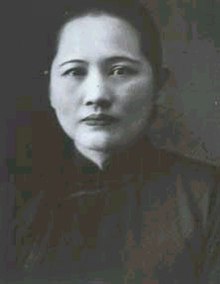Soong Ching-ling
Rosamond Soong Ch'ing-ling (27 January 1893 - 29 May 1981), also known as Soong Qingling, was a Chinese political figure. As the third wife of Sun Yat-sen, one of the leaders of the 1911 revolution that established the Republic of China, she was often referred to as Madame Sun Yat-sen. She was a member of the Soong family and, together with her siblings, played a prominent role in China's politics prior to and after 1949.

After the establishment of the People's Republic of China in 1949, she held several prominent positions in the new government, including Vice Chairman (1949–1954; 1959–1975) and Vice Chairman of the Standing Committee of the National People's Congress (1954–1959; 1975–1981), traveled abroad during the early 1950s, representing her country at a number of international events. In 1968, she and Dong Biwu as Vice Presidents became de facto Heads of State of China until 1972. As the acting Chairwoman of the Standing Committee of the National People's Congress from 1976 to 1978, Soong was again the acting Head of State. During her final illness in May 1981, she was given the special title of "Honorary President of the People's Republic of China". Soong was the first female Chinese head of state in its history, a position that did not appear again until 2016 when Tsai Ing-wen assumed the presidency of the Republic of China, which the polity now governs Taiwan.
Quotes
edit- Sisters — those of you on the free soil of liberated China, to whom I can shout these greetings; those of you at home in your own land or region of people's democracy, who likewise can openly receive respects from this historic conference; those of you in the darkness of oppression, to whom I must whisper these salutations; to Asia's women, one and all — hail to your courage; a salute to your accomplishments; warm wishes for your continued progress toward complete emancipation!
- Excerpt of speech at the Asian Women's Conference in Beijing (11 December 1949)
- In the last analysis, all revolutions must be social revolutions, based upon fundamental changes in society; otherwise it is not a revolution, but merely a change of government.
- Hahn, Emily. The Soong Sisters: Generic, 1941
- Children should have healthy artistic accomplishments and a good taste for literature and art. Things like elegant music, art and literature can play an important role in cultivating children's temperament, helping children to resist those unhealthy and harmful things and develop beautiful and noble sentiments.
- In her essay May the Saplings Grow Healthily (Chinese: 愿小树苗健康成长)
- The people are patient, but the stomach cannot wait too long.
- Djakarta Dispatches (1960)
- In my mind, there is still the idea of fraternity in the Bible.
- In a letter written to her Japanese friend Fumiko Niki in 1978, 宋慶齡基督教思想之演變
About Soong Ching-ling
edit- Comrade Soong Ching Ling dedicated herself entirely, in a time of seventy years, to China’s democracy and socialist cause and to world peace and development. She had been unwavering in her political principles in all circumstances, unyielding to threats and absolutely incorruptible by wealth. Her noble character and integrity will always be remembered. What’s more precious is that she progressed with the times, from being a great revolutionary democratic to a great communist.
- Deng Xiaoping, "Memorial Speech at Soong Ching Ling’s Funeral" (3 June 1981)
- Soong Qingling personifies modern China… [She] personally participated in all stages of the Chinese revolution.
External links
edit- Encyclopedic article on Soong Ching-ling on Wikipedia
- Media related to Soong Ching-ling on Wikimedia Commons